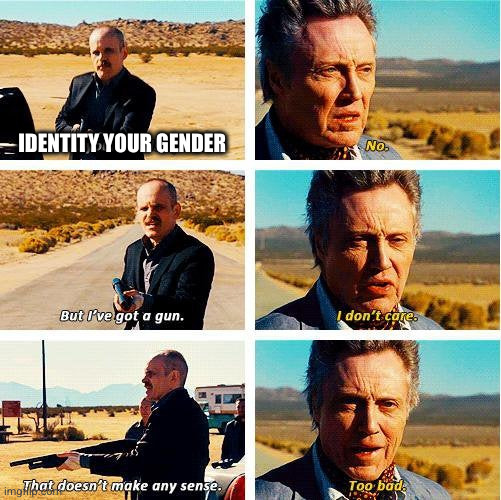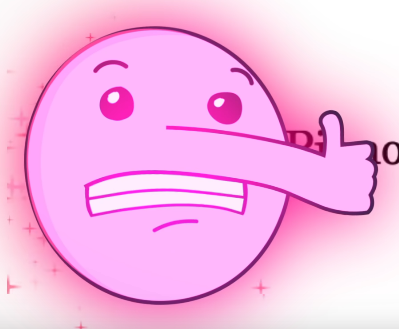France is a lie schemed up by the British monarchy in the 1400s to reinforce traditional power structures via a common enemy.
I want to understand tho. Like, yeah I don’t need to, to not be an asshole; but I still want to understand everything I don’t. I’m curious like that.
Also, because gender is a social construct, it requires that enough people understand it to a sufficient degree.
As opposed to French, which famously exists as a natural truth of the universe. Even if we had never discovered French it would still be there… waiting.
I think the language analogy is actually very apt, because not every has to understand it, but the people you want to speak French with necessarily have to know it. Otherwise it just doesn’t fulfil any purpose.
Gender’s an overloaded term. Are you talking about the internal feeling, the way someone’s treated by others, the shared sense of a variable that differentiates people, social institutions, ideas, or something else?
Those of course are all related very strongly, but they’re not the same thing. Different models of gender will define of differently, but that’s usually just to best fit the area they’re applicable to. If a philosopher tells you gender is a social construct, that’s because they’re analyzing things through the lens of social construction. Very useful, but merely one perspective.
I mean, I guess there’s a point to that, but isn’t there inevitably a social aspect to it? Especially in this post, where the person is saying others don’t have to understand it, meaning it’s clearly outwardly visible and part of who they are.
I’m not saying you should seek approval from anyone (for your gender nor anything else), because that’ll never happen. But denying the importance of some social acceptance for things in the social sphere is kind of weird, and feels like a “haha, unless…?” thing; you want others to understand and accept it, but the moment you don’t their acceptance becomes irrelevant and you never sought any acceptance at all. It feels like an unhealthy way to cope with rejection.
You don’t have to understand it, but you do have to accept it. That’s not “haha, unless”.
I think that’s the sign of a good person
If you build a world for good persons, it’ll collapse in your lifetime.
Good persons want to understand each other. People don’t - they want to think as little as possible above all else
France isn’t real!
Somebody has a gender you don’t understand. Tough
Also
Somebody doesn’t understand your gender. Tough.
Nothing a discussion can’t clarify.
While I agree with your sentiment, there is a difference between not understanding and actively disparaging. The former is fine - there’s plenty of stuff I don’t understand, and I just don’t comment on it because I have no business doing so. Where I take objection is when the lack of understanding transforms into bigotry and disparaging remarks.
By all means be ignorant (and I don’t mean that in a derogatory manner - we are all ignorant about various things), but don’t let your ignorance manifest into negativity.
Agreed.
Don’t understand. Fine.
Assumptions, deliberate misunderstandings and misrepresentations. Not fine.
And in French everything has a gender: a table? Definitely a she. A coat hanger? Looks like a he to me. A car? Look at those curves, she it is. That truck though, totally masculine. But the trailer behind it, still a she.
The funny thing with gendered languages is that synonyms can have different genders. So “el pollo” and “la gallina” both mean “chicken”, but their grammatical gender differs.
And in Germany, a girl is genderless until she grows up 😄
la polla :3
yeah really interesting in this case both come from Latin, and both made their way in the modern languages, one in its masculine form the other in its feminine form.
- Pullus (adj.) very small (animal), a young rooster, “pulla” for the female chicken. French : la poule
- Gallus (name) rooster, “gallina” for the female chicken. French : le gallinacé (a chicken specimen, member of the species Gallus domestica)
i want to wedgie the people who decided to call it “gender” in grammar, people don’t associate tables with femininity or whatever, it’s just an arbitrary grouping that has no inherent meaning, the only reason we force associations with social gender is because inevitably the words “man” and “woman” belong to one of the groupings.
Like in swedish you can say “timma” or “timme” (hour), but no one’s going to think you’re somehow implying that the unit of time itself is somehow gendered.

This is a week analogy… french only works as a means of communication because it has internal rules that are objective (as in different people understand the same/very similar thing when hearing/seeing a symbol/word).
Singularity of experience is cool, but anything social requires communication/synchronization.
Even though gender is used as a box or definition people are forced to fit into (and this is bad), reducing human experience to a blackbox kind of singularity is a highly individualist take.
You can work on understanding each other without forcing anyone to fit into your definition…
Language isn’t objective though. It wasn’t handed down from some deity.
Language is a constantly evolving negotiation of new and remixed communications, performed through billions of interactions every single day. It’s collaborative and unpredictable and sometimes someone comes up with something cool and the next day everybody is copying them.
In short, language is socially constructed.
I think it’s a great analogy for gender in that respect.
Objective and socially constructed isn’t a ‘hard’ contradiction.
Yes of course language evolves and so on, but in a given time(period) it needs to be interpretable more or less independently from the specific actor (a dictionary ensures this, even though it needs to be updated regularly).
In other words yeah sometimes language comes up with new stuff. If it would do it all the time, it wouldn’t function
It does change all the time, and dictionaries don’t ensure any kind of standard. The linguists who write dictionaries will tell you that their only function is to describe the most popular parts of the language, not to prescribe any particular rules. Telling people how they should speak doesn’t actually work.
I could say the phrase “abso-fucking-lutely” and you understand it, even though it’s not in the dictionary. That’s still language, it’s still English.
And I don’t know what you mean by a “‘hard’ contradiction” or why that matters. My point is that both language and gender are forms of communication that rely on socially constructed signifiers and they are both fluid to a similar degree, so the analogy is good. If you want to argue with me, that’s the point you should be dealing with.
Well my point is just it’s neither fully determined as in ahistoric rule nor random as in “changes all the time” or “everyone has their own singular definitions and concepts”. And in between there is the sweet spot of understanding, interpretation and development…
Right, but nobody except grammar nazis and the sith deal in absolutes like that.
Obviously the signifiers have a level of stability otherwise nobody would understand any of it.
This is yet another way in which language and gender are analogous.
People don’t know what words mean in English either yet continue trying to force their made up definitions on others.
Language is objective, because a language is an immaterial object. The opposite, subjective, would impy that language itself has an experience of the world as an entity in itself; that it is a subject.
People’s understanding of the languages they speak is subjective (the subject is the person), but their use of language is objective, because they create objects (words, sentences) in the air or on a screen. When another person, a subject, reads those objective words, they then have a new subjective understanding of them. But the words, and the language, remain objects.
Words are objects in a sense, although they are abstract, but there is no singular objective language in the same way that there is no objective gender. Both are intersubjective, they are interactions negotiated between subjects. There is no fixed object that you can point to and call “language” independent of a subjective experience of that language.
And your argument could be applied to expressions of gender. A feminine dress is an object, and a beard is an object. These are gender signifiers, but that doesn’t make gender itself objective in any way. The analogy to language is very close. They are both sets of signifiers.
Subjective in this sense would mean everyone has their own singular way as opposed to “its the same/similar indepently of the person looking at it”.
language is objective
no
People don’t agree what sentences and words mean all the time. Every single linguist on earth disagrees with you
“/similar”
The analogy probably gets used for longer than just one week
Thanks I am going to harass French people now
It’s hard they don’t care what you or anyone else thinks
Removed by mod
Respecte mon genre !
This is a good place for that reminder that the big lexicon of sexualities, romantic orientations and gender identities are something to help you figure out what your business is. Other people will sometimes have identities that do not appear to match their behavior, and that is fine.
This was the whole point of Russell T. Davies television series Bob & Rose (Bob is gay man who falls in love with Rose, a straight woman, and everybody freaks the fuck out. )
Or to put it another way, if a friend of yours is a lesbian but sometimes likes the d, or has a d or is enby, id est, not a woman, they are still a lesbian.
Most of the lesbian community is down with this, in my experience, but the lesbian community – and the LGBT+ community in general – has a long history of gatekeeping, especially of shutting out bi folk and trans folk. And we need peers, friends and allies on the same page. So here we are with the bus driver tapping the sign.
If a straight man sometimes like the d, are they still a straight? Obligatory Asking for a friend.
Regardless of the answer, I’m not going to police someone on their identity.
If a guy likes the d but identifies as straight, then yes, he’s straight.
If a guy likes the d (and less so the v) but also musicals and brunching and still identifies as straight, then he’s straight.
At very least, the closet continues to be a necessity for some folk in intolerant circumstances.
Identity is something one works out for themselves. Heck the Kinsey scale implies almost everyone should be bi, (even if not very bi) and yet our booleanist society seems to want to categorize only Kinsey-0 as straight (with everyone else as Oh-So-Gay).
Removed by mod
Nah, forget about trying to reason with them. They’ll just respond with “I honestly don’t care, I just don’t like it being shoved down my throat all the time!”, even though it isn’t actually being ‘shoved down their throat’, but you can’t reason them out of a subjective delusion like that.
My gender is so difficult to comprehend for cis people that I just call myself a women so I dont confuse them
deleted by creator
Im a demigirl, the other part fluxuates between agender/pangender while simultaneously is genderfluid (transfem + demigirl + genderfluid + genderflux) :3

After some googling two things happened:
-
I kind of understand your gender(s)? Maybe?
-
I learned some concepts about gender that I was very unaware of.
A great way to understand it is im part girl part everything else
-
I’m just mystified how you know yourself that well, sitting here in my puddle of self doubt
Trust me, as much as I know theres a lot I still dont. I have no idea why the other half fluxuates and I cant explain or comprehend what it fluxuates between. Sometimes its standard masculine and feminine but sometimes I just want to not have a physical form and just be a concept.
No, no, the bigots hate people who speak French too


















